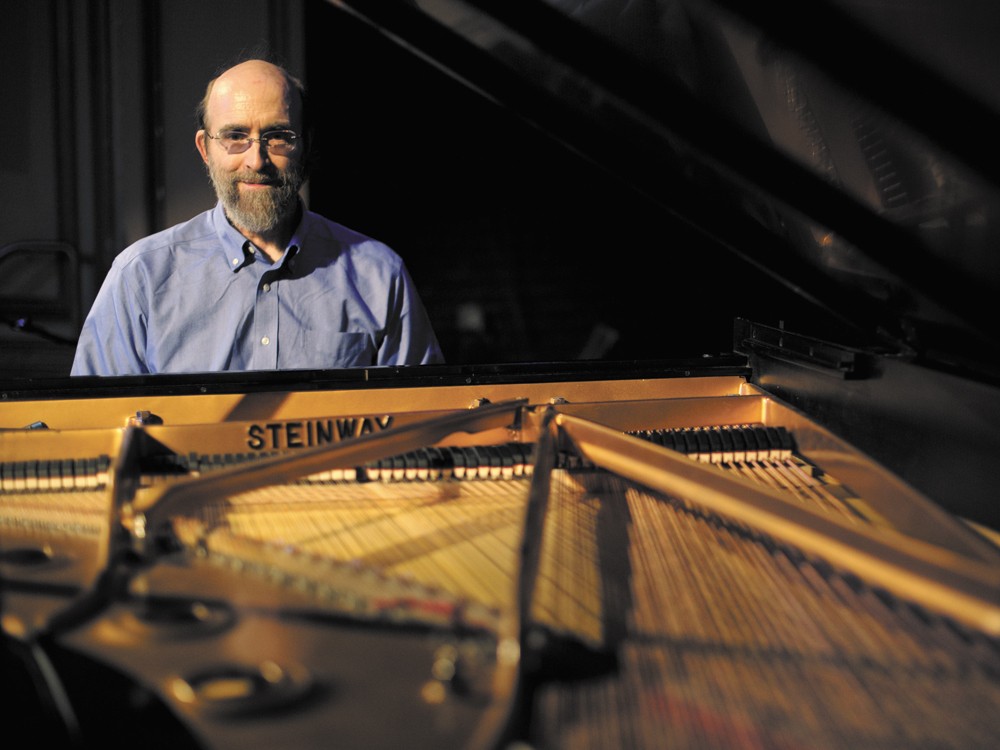
“What do you want? You want the good mayonnaise or dad’s mayonnaise?”
It’s a little before noon on a Tuesday and my mother is in her kitchen, knuckle deep in a Costco-sized package of pastrami. “You want mustard?” she asks. I say I do.
“Do you want chips? They’re the good chips.” I say, sure.
“So, are you doing a story on this?” I remind her that I am.
I have come to talk to her about her singular love for the pianist George Winston, hoping, by extension, to understand the devotion he inspires in literally millions of people.
She has insisted on making me a sandwich first.
“Is your back still buggin’ ya?” she asks with concern. I say yes. She takes a deep breath, as though my bulging discs have bruised her soul. She says she worries about my back. She worries about everything.
“What kind of bread do you want?” she asks, hoping that will help. “We’ve got that good sourdough.” I say sourdough sounds good.
“So, are you doing a story on this?” I try not to laugh. Yes. Mom. I am doing a story. Before I get all the words out, she asks, “You say you wanted chips? They’re the good chips.”
I should say here that my mother does not have Alzheimer’s or any kind of dementia. She is a smart, alert woman who happens to communicate by asking a question, then asking the same question again, and often a third time.
I say I’ll have just a few chips. She hands me four.
My mother is the most giving person I have ever known, second-only to her mother, perhaps. She comes from a long line of givers. She will give until she collapses, like a bloodhound.
My mother has diagnosed herself obsessive-compulsive. The rake lines in her flower bed seem to support this theory.
The saddest I have ever seen her — except for when her mother died — was the last time George Winston played a concert in town, and I forgot to get her tickets. I bought her tickets for this week’s show nearly a year ago, and gave them to her at Christmas. She smiled like that was the happiest I’d ever made her.
Though largely dismissed by the media — a 1991 write-up by New York Times critic Stephen Holden was the last time a major media outlet took interest in his work — two of Winston’s albums have gone platinum: the seasonal works Winter into Spring and December. Everything else has sold well, too. Montana: A Love Story spent almost two years on the top of the New Age charts. Forest won a grammy in 1995 for Best New Age Album.
And although he was an early and eager champion of what would come to be called New Age music, the New Age tag doesn’t really fit George Winston. Jazz and blues don’t either, though Winston counts numerous R&B and stride-style keyboardists among his influences. Holden says his work projects “a Currier & Ives vision of Americana,” and that’s a pretty good description, despite the dismissive undertone.
Winston makes music in the American folk idiom, playing songs in a clear narrative style that tells stories in the middle range of human emotion, from slightly sullen to a little bit bubbly. His seasonal work is like the soundtrack for a landscape, and it is the very definition of Easy Listening.
Winston is one of the few comforts my mother allows herself. He is the only thing, to my knowledge, that slows her down.
She says she first heard him, “gosh, years ago,” at my Aunt Kristen’s house. She said she was drawn to the way his music flows, progressing steadily from emotion to emotion. Years later, she got a piano so she could learn to play his work. She specifically wanted to be able to reproduce the opening salvo from “Thanksgiving,” which starts brooding and slow and grows brighter and more spry as though waking from a dream.
The last time I saw her play the piano she was muddling her way through the vocal melody of Billy Joel’s “Just The Way You Are.” It only adds to her appreciation of Winston, she says, knowing how hard it is to play the piano.
After my sandwich, I join my mom in the family room. She is on the couch, feet up, still for the first time since I’ve arrived. I ask her what she loves so much about his music.
“It’s soothing,” she says, “very relaxing. It’s hard for me to get relaxed.”
The flow, she says, “It makes you sit back. It makes you slow down.” She says it changes her focus from what needs to be done to what has already been done. “Like, if you notice your yard, you don’t notice the leaves in the flower beds.”
George Winston is not for casting a critical eye. George Winston is appreciation music.
We sit for a while, listening. Winston’s December moves from “Thanksgiving” to a riff on Bach called “Joy” to Winston’s own “Prelude” to his take on “Carol of the Bells.” The middle of that track brings a descending twinkle of keys like a candy rain shower. “That!” she says, a smile spreading across her face, “can you imagine being able to do that?”
We listen together to the end of the song then, almost in a trance, she points over to the wall that holds the piano.
“You should take a picture of that piano right there. Put that in your story. This is the only reason I got it,” she says, stepping inexplicably into a faint Brooklyn accent. “I got it fah Geo-ah-juh.”
George Winston • Tue, Sept. 11 at 7 pm • Bing Crosby Theater • 901 W. Sprague • Thu, Sept. 13 • Panida Theater • 300 N. 1st St. Sandpoint • 509-325-SEAT • ticketswest.com

















